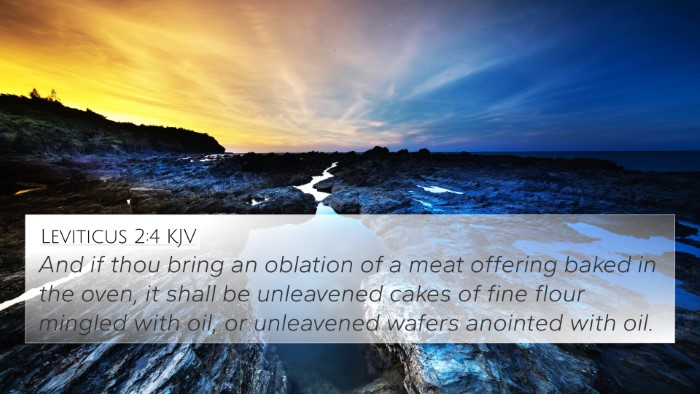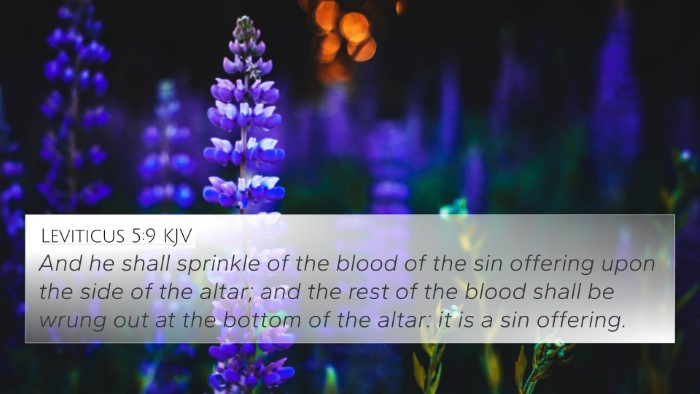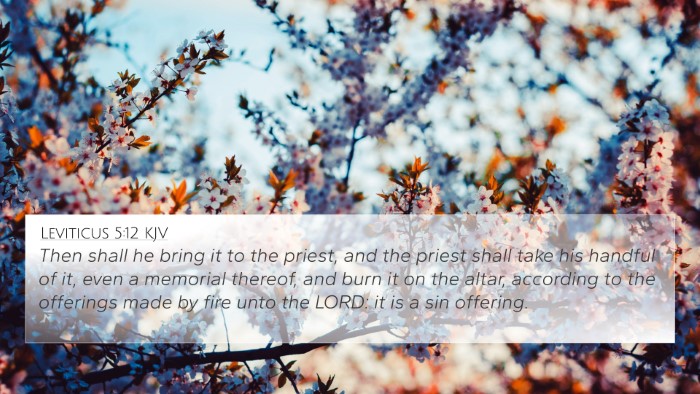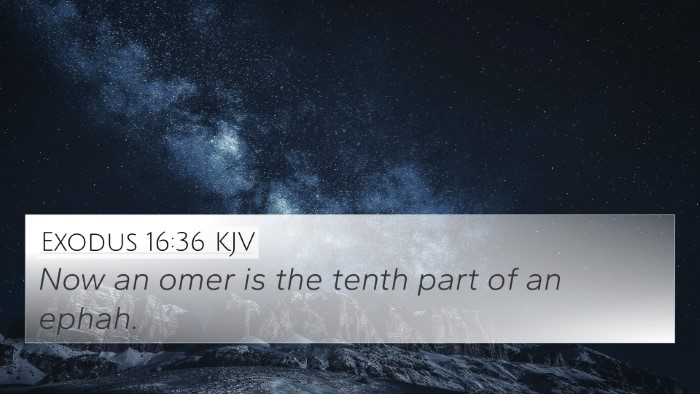Understanding Leviticus 5:11
Leviticus 5:11 states:
"But if he cannot afford two turtledoves, or two young pigeons, then he shall bring his offering for the sin which he has committed, one tenth of an ephah of fine flour for a sin offering. He shall not put oil on it, nor shall he put frankincense on it, for it is a sin offering."
This verse highlights essential elements of the sacrificial system in ancient Israel, especially the provisions made for those who could not afford the more expensive offerings.
Key Themes and Explanations
- Provision for the Poor: The ability to bring fine flour as an offering signifies God's concern for the poor and marginalized within the community. It emphasizes that acceptance before God is not based on wealth but on sincere repentance and willingness to make amends.
- Nature of Sin Offerings: The lack of oil and frankincense indicates that this offering was strictly for sin. Such specifications stress the seriousness of the offense and the purity required in approaching God.
- Sin and Atonement: This verse reinforces the concept that sin requires acknowledgment and a corresponding act of atonement. The alternative offering signifies the need for humanity to seek reconciliation with God, even if resources are limited.
Comprehensive Bible Cross-Referencing
Leviticus 5:11 is intricately connected to several other scripture passages. Below are pertinent cross-references that highlight its thematic links:
- Exodus 30:15: Discusses different offerings for those who cannot afford larger sacrifices.
- Leviticus 14:21: Emphasizes that provisions are made for the poor in the context of sin offerings in cases of cleansing from leprosy.
- Isaiah 66:3: Talks about the heart's condition behind the sacrifice, emphasizing that the offering must be sincere.
- Matthew 5:23-24: Jesus teaches the importance of reconciling with others before offering to God, highlighting the inner spiritual state rather than just the ritual.
- 1 Peter 1:18-19: The blood of Christ is related as the ultimate and perfect offering, echoing the need for sacrifice and atonement throughout the scripture.
- Hebrews 10:4: Explains the insufficiency of animal sacrifices, pointing towards the need for Christ's sacrifice for true atonement.
- James 5:16: Encourages believers to confess their sins to one another, linking personal accountability with communal reconciliation.
Bible Verse Connections
Understanding Leviticus 5:11 involves recognizing the connections and themes shared across the Bible:
- Connecting Offerings: This verse connects to the broader topic of offerings in Leviticus, emphasizing God's desire for His people to approach Him with genuine hearts.
- Inter-Biblical Dialogue on Forgiveness: Throughout the Old and New Testaments, there is a consistent theme of the necessity of sacrifice and its relationship with sin.
- Thematic Parallels in Gospels: The Gospels illustrate Christ as the fulfillment of the sacrificial laws, showcasing a comprehensive theological narrative that inclusively engages Old Testament practices.
- Exploration of Sin and Redemption: The sin offerings draw a line directly to the ultimate offering of Christ, as the New Testament writers interpret the sacrificial system through the lens of redemption and salvation.
Tools for Bible Cross-Referencing
To study Leviticus 5:11 in depth, consider using various resources:
- Bible concordance: Use a concordance to locate instances of sin offering in Scripture.
- Bible reference resources: Invest in a good study Bible that includes cross-references in its margins.
- Cross-reference Bible study notebooks: Keep a journal to document connections and insights as you study various passages.
- Comprehensive Bible cross-reference materials: Many online databases and software offer extensive cross-referencing for deeper studies.
Conclusion
Leviticus 5:11 serves as a pivotal verse that encapsulates God's grace, the importance of offerings, and the pathway to atonement. By combining insights from various public domain commentaries and identifying connections with other scriptures, individuals can gain a more profound understanding of the theological implications of this verse within the broader narrative of the Bible.
As you explore these connections, consider the heart behind sacrifices and the call for genuine repentance. Let this verse encourage a sincere approach to God, regardless of your situation, and remind you of His unwavering mercy and provision.


















